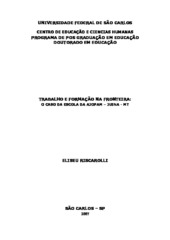Mostrar el registro sencillo del ítem
Trabalho e formação na fronteira: o caso da escola da AJOPAM - Juina - MT
| dc.contributor.author | Riscarolli, Eliseu | |
| dc.date.accessioned | 2016-06-02T19:35:30Z | |
| dc.date.available | 2007-05-14 | |
| dc.date.available | 2016-06-02T19:35:30Z | |
| dc.date.issued | 2002-02-27 | |
| dc.identifier.citation | RISCAROLLI, Eliseu. Trabalho e formação na fronteira: o caso da escola da AJOPAM Juina - MT.. 2002. 174 f. Tese (Doutorado em Ciências Humanas) - Universidade Federal de São Carlos, São Carlos, 2002. | por |
| dc.identifier.uri | https://repositorio.ufscar.br/handle/ufscar/2187 | |
| dc.description.abstract | The life follows on by the frontier independently from the actions of the State, however its presence is merely to guarantee certain basic conditions of the workers who, voluptuaries or stimulated by the official programs of settling, use to go disclosing the forest and affirming, "unconsciously" the condition of the Brazilian State. The Present work has as object to study the actions undertaken by the Organized Association for Mutual Aid - AJOPAM - in the northwest of Mato Grosso according to what refers to the developed organizational and pedagogical process from 1986, more specifically around those that agglutinated the formation and professional qualification of the agricultural workers, configured as the School of Agriculturists Technician that started working in the 1997. Giving more importance for the professional preparation of the workers, installing some new conceptions and relation between the men and the nature, after all when they transform the landscape imagining that the natural resources will be forever abundant. It has passed less than twenty years of the occupation that was stimulated by the State in the region and what we see is the indifference of the public politics, principally related to the environment which makes us to incorporate it in a different pedagogy of the land, not because of the tendencies of the moment, that could be pos modern, but as a possibility for the future generations to have survival conditions. In this way, the fights of the agricultural workers, women or men, are not established in the contradiction of the way of working but on the forms that it is organized there and that they are results of the workers actions and their social movements like the AJOPAM that shows their new perspectives of working, dreaming, utopias, frustrations and desires to see, in a brief future, better conditions of education, culture, health, transport and social providence. | eng |
| dc.description.sponsorship | Financiadora de Estudos e Projetos | |
| dc.format | application/pdf | por |
| dc.language | por | por |
| dc.publisher | Universidade Federal de São Carlos | por |
| dc.rights | Acesso Aberto | por |
| dc.subject | Educação | por |
| dc.subject | Trabalho | por |
| dc.subject | Formação profissional | por |
| dc.subject | Education | eng |
| dc.title | Trabalho e formação na fronteira: o caso da escola da AJOPAM - Juina - MT | por |
| dc.type | Tese | por |
| dc.contributor.advisor1 | Silva Junior, João dos Reis | |
| dc.contributor.advisor1Lattes | http://genos.cnpq.br:12010/dwlattes/owa/prc_imp_cv_int?f_cod=K4786379H5 | por |
| dc.description.resumo | A vida na fronteira se desenrola independente das ações do Estado, todavia, sua presença é fundamental para garantir certas condições básicas dos trabalhadores que, voluntariamente ou incentivados pelos programas oficiais de colonização, vão desvendando a floresta e afirmando, inconscientemente , a condição da nação brasileira. O presente trabalho tem como objeto de estudo as ações empreendidas pela Associação Organizada de Ajuda Mutua AJOPAM - no noroeste de Mato Grosso, no que tange ao processo organizativo e pedagógico desenvolvido a partir de 1986, mais especificamente, o que se aglutinou em torno da formação/qualificação dos trabalhadores rurais, configurado na Escola de Agricultores Técnicos, cujos trabalhos, se iniciaram no ano de 1997, objetivando, pela formação, instalar uma nova concepção e relação do homem com a natureza, principalmente quando este transforma a paisagem, imaginando que os recursos naturais seriam inesgotáveis. Passados menos de vinte anos da ocupação incentivada pelo Estado na região, o descaso das políticas públicas, sobretudo as relacionadas ao meio ambiente, obrigando-nos a incorporar uma outra pedagogia da terra, não por força dos modismos pós-modernos, mas como possibilidade de as gerações futuras terem condições de sobrevivência. Desse modo, as lutas dos trabalhadores, rurais ou não, mulheres ou homens, são lutas estabelecidas na contradição das formas de trabalho que lá estão estabelecidas e que são frutos das ações dos poderes constituídos ou dos movimentos sociais que, como a AJOPAM, vão edificando novas perspectivas de trabalho em corpos marcados por sonhos, utopias, frustrações e desejos de verem, num futuro breve, melhores condições de educação, cultura, saúde, transporte e previdência social. | por |
| dc.publisher.country | BR | por |
| dc.publisher.initials | UFSCar | por |
| dc.publisher.program | Programa de Pós-Graduação em Educação - PPGE | por |
| dc.subject.cnpq | CIENCIAS HUMANAS::EDUCACAO | por |
| dc.contributor.authorlattes | http://lattes.cnpq.br/2153949223770275 | por |
